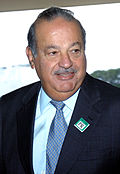  Top row (left to right) Some of the figures are of Lebanese Descent, while others are Lebanese Citizens Charbel Makhluf • Estephan El Douaihy • Former Lebanese President Camille Chamoun • Fairuz • Khalil Gibran • Carlos Slim • Sabah • Carlos Ghosn • Charles Elachi • John Abizaid • Donna Shalala • Ray LaHood • U.S. Presidency Candidate Ralph Nader • Michel Temer • Rima Fakih • Contents |
This is a list of notable Lebanese individuals born in the Lebanese diaspora of Lebanese ancestry or people of dual Lebanese and foreign nationality who live in the diaspora.
Country listings:












